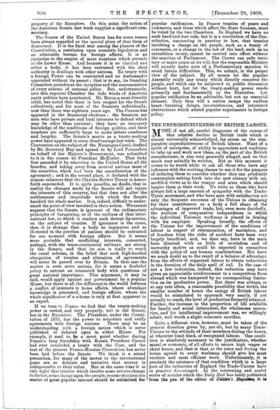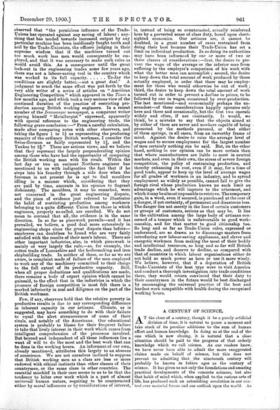THE UNPRODITCTIVENESS OF BRITISH LABOUR.
MOST, if not all, careful diagnoses of the causes of that relative decline in British trade which is almost universally acknowledged, lay stress on the com- parative unproductiveness of British labour. Want of a spirit of enterprise, of ability to appreciate and readiness to take up and work new ideas, on the part of the British manufacturer, is also very generally alleged, and on that much may suitably be written. But at this moment it seems to us worth while to ask all those who have any influence with the working classes to use it for the purpose of inducing them to consider whether they can prudently contemplate setting forth into the new century with un- modified views as to the temper and aims which should inspire them in their work. We write as those who have always felt a large amount of sympathy with the Trade- Union movement, and who have seen with satisfaction not only the frequent successes of the Unions in obtaining for their constituents as a body a full share of the advantages of improved trade, but, even more decidedly, the position of comparative independence in which the individual Unionist workman is placed in dealing with his employer. Speaking broadly, the efforts of the Unions for the improvement of the conditions of labour in respect of remuneration, of sanitation, and of freedom from the risks of accident have been very largely beneficial, and, we dare say, have in the main been directed with as little of unwisdom and of unworthy motive as could be expected in connection with the policy of any human combinations. Nor have we much doubt as to the result of a balance of advantage from the efforts of organised labour to obtain reductions in the duration of the daily spell of toil. In the case of not a few industries, indeed, this reduction may have given an appreciable reinforcement to a competition from abroad which was hampered by no corresponding limita- tion on its productive power. But there was always, or at any rate often, a reasonable possibility that within the smaller number of hours the energy of British labour would be stimulated to approach very nearly, if not actually to reach, the level of production formerly attained. Further, the increase in the proportion of life available for family and social intercourse, for wholesome recrea- tion, and for intellectual improvement was, we willingly admit, well worth a slight economic sacrifice.
Quite a different view, however, must be taken of the general direction given by, not all, but by many Trade- Unions to the attitude of their members during the hours, at whatever limit fixed, of recognised labour. One condi- tion is absolutely necessary to the justification, whether moral or economic, of all efforts to secure high wages or short hours, and that is that at the rates and during the hours agreed to every workman should give his most resolute and most efficient work. Unfortunately, it is precisely the existence of that condition which in a large part of the industries of England the Trade-Unions have in practice discouraged. In the interesting and useful series of articles which the Daily Mail has lately published from the pen of the editor of Feildsn's Magmas, it is observed that "the pernicious influence of the Trade- Unions has operated against any saving of labour : any- thing that has tended towards increased output by any particular machine has been insidiously fought tooth and nail by the Trade-Unionists, the officers judging in their supreme wisdom that if the machines turned out too much work less men would consequently be em- ployed, and that it was necessary to make such rules as would avoid this. As a consequence until the great lock-out in the engineering trades some few years ago, there was not a labour-saving tool in the country which was worked to its full capacity To-day the conditions are slightly better,—not a great deal." A judgment to much the same effect was put forth by the very able writer of a. series of articles on "American ligineering Competition" which appeared in the Times a few months ago, and which took a very serious view of the continued duration of the practice of restricting pro- duction among British working engineers. In a recent number of the Ironmonger newspaper, a competent writer signing himself " Metallurgist " expressed, apparently with special reference to the engineering trade, the following grave conclusion :—" From a careful calculation, made after comparing notes with other observers, and taking the figure I to 11- as representing the producing capacity of the ordinary British workman, I consider the Swiss-German as fairly represented by 1, and the Yankee by 21." These are serious views, and. we believe that they represent the largely preponderating opinion among those who have had the opportunity of comparing the British working man with his rivals. Within the last day or two an eminent Northern engineer has mentioned to us with indignation the fact that if he steps into his foundry through a side door when the foreman is not present he is apt to find moulders idling in a manner which, considering that they are paid by time, amounts in his opinion to flagrant dishonesty. The moulders, it may be remarked, were not concerned in the great engineering dispute, and the piece of evidence just referred to illustrates the habit of restricting production among workmen belonging to a quite different Union from those in which engineers, properly so-called, are enrolled. We do not mean to contend that all-the evidence is in the same direction. In so far as piecework prevails—and it has prevailed, we believe, a good deal more extensively in engineering shops since the great dispute than before— employers can doubtless be found who are very fairly satisfied with the results of their men's labour. There are other important industries, also, in which piecework is mainly or very largely the rule,—as, for example, the cotton trade of Lancashire and the boilermaking and iron shipbuilding trade. In neither of these, so far as we are aware, is complaint made of failure of the men employed to work any of the machinery committed to their charge to the full extent of its productive capacity. Still, when all proper deductions and qualifications are made, there remains a body of expert opinion which cannot be gainsaid, to the effect that in the industries in which the pressure of foreign competition is most felt there is a marked inferiority in zeal and diligence on the part of the British workman.
Few, if any, observers hold that the relative poverty in productive results is due to any corresponding difference in inherent capacity in our artisans. Climate, as is suggested, may have something to do with their failure to equal the alert strenuousness of some of their rivals, and notably of the Americans. Our educational system is probably to blame for their frequent failure to take that lively interest in their work which comes from intelligent comprehension of the processes involved. But beyond and independent of all these influences lies a want of will to do the most and the best work that can be done in the working hours. An informant of our own, already mentioned, attributes this largely to an absence of conscience. We are not ourselves inclined to suppose that British working men as a class are less or more endowed with ethical instincts than other classes of their countrymen, or the same class in other countries. The essential mischief in their case seems to us to be that the tendency to loiter over work which is a part of almost universal human nature, requiring to be counteracted either by moral influences or by 'considerations of interest, is, instead of being so counteracted, actually reinforced here by a perverted sense of class duty, based upon short- sighted economics. Our artisans are, it cannot be doubted, in a great number of cases restrained from doing their best because their Trade-Union has set a limit on individual production. In so doing its authorities may have been influenced by one or more of two or three classes of considerations :—first, the desire to pre- vent the wage of the average or the inferior man from suffering by the employer's comparison of his work with what the better man can accomplish ; second, the desire to keep down the total amount of work produced by those actually employed, in order that there may be employ- ment for those who would otherwise be out of work ; third, the desire to keep down the total amount of work turned out in order to prevent a decline in prices, to be followed by one in wages, occasioned by over-production. The last mentioned—and economically perhaps the un- soundest—of these considerations happily operates only here and there and occasionally, but the first two operate widely and often, if not coristantly. It would, we think, be a mistake to say that the objects aimed at by either of them are never and nowhere capable of being promoted by the methods pursued, or that either of them springs, in all cases, from an unworthy frame of mind. Against the desire to raise the average level of wages and to secure employment for the largest number of men certainly nothing can be said. But, on the other hand, nothing in our opinion can be more certain than that where manufacturers are liable to meet in neutral markets, and even in their own, the stress of severe foreign competition, the policy of restraining production, and thereby enhancing its cost, even if it may, for a time of good trade, appear to keep up the level of average wages for all grades of workmen in an industry, and to spread employment as widely as possible, cannot fail to give the foreign rival whose production knows no such limit an advantage which he will improve to the uttermost, and which it may be almost impossible to retrieve. The temporary gain, in a word, even if secured, is purchased at the cost of a, danger, if not certainty, of permanent and disastrous loss. The danger lies not merely in the loss of certain customers or groups of customers, serious as that may be. It lies in the cultivation among the large body of artisans con- cerned of a temper which is unfavourable to good work- manship, and for that matter to good citizenship too. So long and so far as Trade-Union rules, expressed or understood, are so drawn as to discourage masters from introducing new labour-saving appliances, and clever and energetic workmen from making the most of their bodily and intellectual resources, so long and so far will British trade decline, and deserve to decline, as compared with that of countries in which labour organisations either do not hold so much power as here or use it more wisely. We believe, however, that if a deputation of British Trade-Unionists of the best type were to visit America and conduct a thorough investigation into trade conditions there, they would return convinced that their duty to their countrymen in the future would be best discharged by encouraging the universal practice of the best and hardest work compatible with health during the recognised working hours.



































 Previous page
Previous page